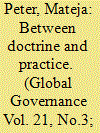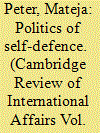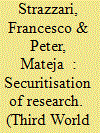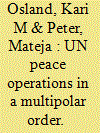| Srl | Item |
| 1 |
ID:
140414


|
|
|
|
|
| Summary/Abstract |
Mandates of recent peacekeeping operations across Africa have shown substantial innovation in the thinking of the UN Security Council. Offensive use of force, use of unmanned aerial vehicles, strategic intelligence and communication, and state-building mandates in the midst of conflicts have all expanded the scope of activities beyond what the UN peacekeepers are accustomed to. The UN is entering a new era of enforcement peacekeeping. Enforcement peacekeeping manifests itself both in enforcement of political solutions through support of a government's state-building ambitions and its attempts to extend state authority in the midst of conflict and in enforcement of military victories through the offensive use of force. These developments further unsettle the basic principles of UN peacekeeping—consent, impartiality, and nonuse of force—resulting in a schism between the doctrine and practice. This contribution argues that such fundamental challenges, when not properly acknowledged, create a wall between operational activities and strategic considerations. They preclude a proper debate on the problematic externalities, in particular on political processes and peacebuilding.
|
|
|
|
|
|
|
|
|
|
|
|
|
|
|
|
| 2 |
ID:
106961


|
|
|
|
|
| Publication |
2011.
|
| Summary/Abstract |
This contribution considers an alternative approach to the research on the use of force, a field that has been largely dominated by international legal scholars. I argue for application of an evolutionary approach to international (legal) norms, one that complements current legal approaches and moves the discussion of norms beyond their dichotomous legal/illegal understanding. This kind of research highlights the role of politics in international law and allows us to determine factors influencing dissemination of international norms. Through a study of seven post-Second World War cases, I trace the development of both narrow and expanded notion of preemptive self-defence and conclude that while ascertaining legality of specific actions is vital for understanding established international law, one cannot talk about radical breaks in development of the law on the use of force. The expanded concept is in fact a product of the evolution of (societal) norms on self-defence and an accumulation of previous successful challenges in metanorms on the use of force.
|
|
|
|
|
|
|
|
|
|
|
|
|
|
|
|
| 3 |
ID:
154071


|
|
|
|
|
| Summary/Abstract |
Knowledge on conflict-affected areas is becoming increasingly important for scholarship and policy. This article identifies a recent change in knowledge production regarding 'zones of danger', attributing it not only to the external environment, but also to an on-going process of securitisation of research resulting from institutional and disciplinary practices. Research is increasingly framed by security concerns and is becoming a security concern in itself, although the implications are not readily acknowledged. To illustrate these developments, we draw on fieldwork in Mali and Darfur.
|
|
|
|
|
|
|
|
|
|
|
|
|
|
|
|
| 4 |
ID:
177758


|
|
|
|
|
| Summary/Abstract |
UN peace operations need a new peacebuilding agenda that acknowledges both the transboundary nature of conflict drivers and the multipolar nature of the global order. This means casting aside the current stabilization approach, but also abandoning the pursuit of liberal peacebuilding of the unipolar era. Such a conflict transformation agenda would require UN peace operations to prioritize the rule of law and bottom-up approaches, thus creating the potential to be embraced by a much broader range of member states. In this article, we bring liberal peacebuilding critiques into a discussion with debates on the nature of the global order. Liberal peacebuilding critiques are rooted in the bottom-up problematization of international interventions and show what kind of peacebuilding is desirable. Conversely, the debates on the multipolar nature of the global order expose the top-down constraints as to what kind of peacebuilding is feasible.
|
|
|
|
|
|
|
|
|
|
|
|
|
|
|
|